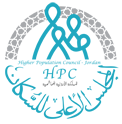

Upon the request of the General Secretariat of the League of Arab States/ Social Sector/ Population Policy Department/ and Technical Secretariat of the Arab Council for Population and Development, the General Secretariat of the Higher Population Council held a training workshop via visual communication technology. The workshop came under the heading ‘Building capacities and skills in the field of preparing policy summaries and fact sheets to assist in the process of establishing and gaining support for population policies and reproductive health programs.’ 67 participants in the field of Arab population councils and committees or akin to them from 20 Arab countries took part in this workshop: Jordan, Bahrain, Tunisia, Algeria, Saudi Arabia, Sudan, Syria, Iraq, Sultanate of Oman, Palestine, Qatar, Kuwait, Lebanon , Libya, Egypt, Morocco, Mauritania, Yemen, Somalia, and The Islamic Federal Republic of the Comoros.
The two-day workshop aimed to provide participants with the requirements, specifications and components of policy papers associated with population and development issues. Another target of the workshop was to introduce participants to means on how to develop policy options or appropriate proposed alternatives to address a widespread social phenomenon that threatens families and individuals.
Dr. Issa Al-Masarweh, HPC Secretary-General, affirmed that this workshop comes in line with HPC General Secretariat’s interest in sharing the best experiences HPC has accrued with fellow members of the Arab Council for Population and Development in Arab countries.
Masarweh pointed out that establishing policies and programs in this field necessitates adopting certain steps, starting with drawing up a policy paper on a selected issue. For an issue to be selected as a topic in a policy paper, three conditions must be met: prevalence, damage, and recognition. Al-Masarweh indicated that the production of policy papers is the most common and dominant form of policy papers as it defines an issue, presents statistics on the extent of its prevalence and popularity as well as the extent of the human damage resulting from this issue. In addition, the production of policy papers proposes possible and applicable alternatives to change the status of the issue and direct it in the desired course, so that the concerned authorities may examine these options and adopt the most appropriate ones. Al Masarweh added that the policy papers linked to population and development aim to place a population issue on the agenda of the decision and policy maker and discuss and deliberate on the possibility of adopting a policy, legislative or procedural options to address the damage resulting from it. Alongside that, Masarweh also indicated that the preparation of policy summaries contributes in bridging the gap between research/researchers and policy-makers.
During the workshop, Ms Rania Al-Abbadi, HPC Assistant Secretary-General, presented training on defining the two concepts of raising awareness, gaining support and advocacy, and distinguishing between them in terms of the concept, the target audience, and the indicators of success measurement.
HPC Technical director and key researcher, Ghaleb Al Azza gave presentations on introducing and defining the concept of policy papers as a tool to interpret the knowledge obtained from institutional and academic research to support decision-making in population issues. Al Azza went on to explain the practical steps in drafting a policy summary, as in holding brainstorming sessions prior to writing a policy summary. This, Al Azza added, is applied in order to identify partners, identify the problem and analyse its root causes using cause analysis tools, define alternatives to problem solving and create criteria for measuring and assessing the alternatives. In addition, it would help in selecting the preferred alternative when addressing the problem.
To sum up, participants received training on how to write a policy brief, instructions and guidelines in writing, structure of the policy brief, and finally, a theoretical presentation and practical application of the good and thorough specifications for the elements of the policy structure being: title, executive summary, introduction, defining the problem and its context, presenting alternatives to address the problem, presenting the analysis of alternatives, choosing the preferred alternative to address the problem and finally, recommendations.
The workshop concluded with the participants presenting application models they had prepared for draft policy papers that deal with priority issues in their countries according to the criteria for preparing policy papers that were acquired during the training workshop. Participants received evaluations for their papers that specified their points of strength and weakness to avoid repeating them and to achieve well-structured policy papers.







